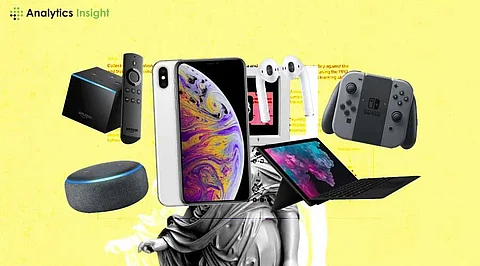

The Consumer Electronics Show (CES) 2025, taking place in Las Vegas, is a grand stage for showcasing groundbreaking innovations in consumer technology. From advanced AI-powered devices to futuristic concepts in the world of sustainability and immersive entertainment, the event is highlighting global technology trends. This year’s CES stands out for its emphasis on artificial intelligence, sustainability, and innovative consumer electronics.
Here’s a detailed overview of the top gadgets and products unveiled at CES 2025.
Nvidia introduced its latest GeForce RTX 50-series GPUs, powered by the new Blackwell AI chip. These GPUs promise substantial improvements in AI-driven rendering, enhancing graphics performance for gaming and professional applications. The flagship RTX 5090 is priced at $1,999, while the RTX 5070 comes in at $549.
Lenovo showcased the ThinkBook Plus Gen 6 Rollable AI PC, featuring a rollable OLED screen that expands from 14 to 16.7 inches. This design offers users flexibility in screen size, catering to both productivity and entertainment needs. The laptop is priced at $3,499.
Samsung unveiled its new laptops, the Galaxy Book5 Pro and Galaxy Book5 360, both emphasizing AI integration. Equipped with Intel Core Ultra processors featuring Neural Processing Units (NPUs), these devices offer enhanced performance and AI-driven features like AI Select and Photo Remaster. The Galaxy Book5 360 also boasts a 360-degree hinge, providing versatility for users. Availability is expected in select markets starting February, with pricing yet to be announced.
Panasonic introduced its flagship OLED television integrated with Amazon Fire TV. This combination delivers exceptional picture quality alongside the convenience of built-in streaming services, offering users a seamless entertainment experience.
Amazon launched the new Echo Spot, a compact smart speaker featuring a customizable display. Designed to fit into smaller spaces, it offers enhanced voice assistant capabilities and seamless integration with Alexa-enabled devices, making it a versatile addition to any smart home setup.
Sony revealed the PlayStation VR 3, the next-generation virtual reality headset designed for the PlayStation ecosystem. It features 4K OLED displays, eye-tracking technology, and a wider field of view, aiming to provide an immersive gaming experience for users.
Acer introduced the Nitro Blaze 8 and Nitro Blaze 11, handheld gaming devices equipped with AMD Ryzen processors and high-refresh-rate displays. These devices offer portable gaming solutions without compromising performance, catering to gamers seeking mobility and power.
Dell showcased Concept Luna, a fully modular laptop emphasizing sustainability. Built with recyclable materials and designed for easy repairability, it reflects Dell's commitment to reducing electronic waste and promoting eco-friendly practices in the tech industry.
Samsung introduced the SolarCell Remote, powered by both solar energy and ambient light. This innovation eliminates the need for disposable batteries, highlighting Samsung's efforts toward sustainable consumer electronics.
In collaboration with Honda, Sony unveiled the Afeela 1, an intelligent electric vehicle equipped with sensors, cameras, and AI that interacts with occupants. The vehicle is priced starting at $89,900, with reservations available in California.
BMW introduced the Panoramic iDrive display, setting new standards for in-vehicle experience with a focus on driver orientation, safety, and personalization. This innovation is part of BMW's commitment to enhancing the driving experience through advanced technology.
Withings launched the Body Scan, a smart scale providing advanced health metrics, including cardiovascular health assessments and body composition analysis. This device aims to offer users comprehensive insights into their health, promoting better wellness management.
Suunto introduced waterproof headphones capable of storing up to 8,000 songs. These headphones utilize AI to help improve swim strokes, catering to fitness enthusiasts seeking to enhance their training with music and performance analytics.
Boston Dynamics presented the Atlas+, an enhanced version of its humanoid robot designed for industrial use. With improved agility and precision, Atlas+ is capable of handling complex tasks in warehouse settings, showcasing the potential of robotics in automating labor-intensive processes.
ElliQ introduced its updated AI companion robot aimed at providing support to the elderly. The robot offers conversational AI, medication reminders, and mood-enhancing activities, promoting well-being and independence among senior users.
CES 2025 delivered an impressive lineup of tech innovations, emphasizing AI, sustainability, and user-centric design. From groundbreaking gaming devices to health-focused wearables and eco-friendly gadgets, this year’s CES showcased the limitless potential of technology to reshape the future. As these products hit the market in the coming months, they are set to redefine consumer experiences across the globe.
